
Lobbying against solutions
Oil companies might claim they are taking the climate crisis seriously but behind closed doors they are working hard to keep drilling for more fossil fuels.
The industry spends large amounts of money lobbying policy-makers and governments to make sure that any new laws and regulations won’t get in the way of their business, often derailing plans that would help society shift to cleaner, renewable sources of energy.
From private meetings with government ministers to a quiet conversation at an oil-sponsored exhibition launch, oil companies spend big money on influencing strategically important decision-makers.
This relentless lobbying isn’t just bad for the climate, it has the potential to distort democracy with the voices of ordinary citizens drowned out by these powerful corporations.
- Ahead of the Paris Climate Summit, the head of the UN’s climate body wrote to oil and gas companies telling them to stop lobbying against steps to tackle global warming
- In 2015, BP was identified as Europe’s biggest and ‘fiercest corporate opponent of action on climate change’
- Shell successfully lobbied to undermine EU renewable energy targets in 2014
Case Studies

Working together to block climate solutions
Oil companies have successfully lobbied to block numerous climate regulations and undermine support for clean energy.

BP: the UK’s biggest lobbyist in Europe
In 2015, BP was named as the company doing the most to obstruct climate action in the EU. According to research by the NGO Influence Map, BP topped the table as Europe’s biggest corporate advocate of dirty energy, and was ‘consistently opposed to all the main forms of climate change regulation’.

Statoil/Equinor spends millions on lobbying
Statoil/Equinor is one of the top ten gas lobbyists in Europe, pushing for new gas pipelines and power plants that would ‘lock in’ the use of this fossil fuel for decades

How Shell stands in the way of renewable energy
Shell pours millions into lobbying policymakers to act in its corporate interest. Given the company’s dependence on fossil fuels for profit, this often means splashing the cash to try and stymie the progress of renewable energy.








